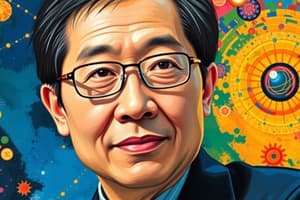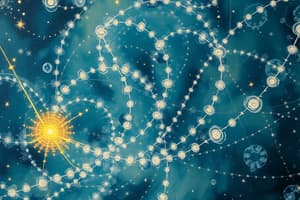Podcast
Questions and Answers
Who was awarded the Nobel Prize in Physics in 1960?
Who was awarded the Nobel Prize in Physics in 1960?
- Chen Ning Yang
- Donald A. Glaser (correct)
- William B. Shockley
- Emilio Segrè
What was the primary contribution of Emilio Segrè and Owen Chamberlain?
What was the primary contribution of Emilio Segrè and Owen Chamberlain?
- Research in quantum mechanics
- Development of the transistor
- Discovery of the antiproton (correct)
- Invention of the bubble chamber
Which Nobel Prize winners investigated parity laws related to elementary particles?
Which Nobel Prize winners investigated parity laws related to elementary particles?
- Willis E. Lamb and Polykarp Kusch
- Pavel A. Cherenkov, Il´ja M. Frank and Igor Y. Tamm
- Chen Ning Yang and Tsung-Dao Lee (correct)
- Frits Zernike and Felix Bloch
What discovery is associated with William B. Shockley, John Bardeen, and Walter H. Brattain?
What discovery is associated with William B. Shockley, John Bardeen, and Walter H. Brattain?
In 1955, who received the Nobel Prize for precision determination of the magnetic moment of the electron?
In 1955, who received the Nobel Prize for precision determination of the magnetic moment of the electron?
Who was awarded the Nobel Prize in Physics in 1954 for research in quantum mechanics?
Who was awarded the Nobel Prize in Physics in 1954 for research in quantum mechanics?
Which method did Frits Zernike demonstrate that contributed to the phase contrast microscope?
Which method did Frits Zernike demonstrate that contributed to the phase contrast microscope?
In which year did Felix Bloch and E.M. Purcell receive the Nobel Prize, and for what contribution?
In which year did Felix Bloch and E.M. Purcell receive the Nobel Prize, and for what contribution?
Who was awarded the Nobel Prize in Physics in 1948 for theoretical work on nuclear forces?
Who was awarded the Nobel Prize in Physics in 1948 for theoretical work on nuclear forces?
Which physicist is known for the invention of an apparatus to produce extremely high pressures?
Which physicist is known for the invention of an apparatus to produce extremely high pressures?
What was the primary contribution of Isidor Isaac Rabi that led to his Nobel Prize?
What was the primary contribution of Isidor Isaac Rabi that led to his Nobel Prize?
Which award year had no Nobel Prize awarded due to fund allocation?
Which award year had no Nobel Prize awarded due to fund allocation?
Cecil Powell received the Nobel Prize for his work in which area?
Cecil Powell received the Nobel Prize for his work in which area?
Who made significant contributions to cosmic radiation detection through the Wilson cloud chamber?
Who made significant contributions to cosmic radiation detection through the Wilson cloud chamber?
What principle is Wolfgang Pauli known for discovering?
What principle is Wolfgang Pauli known for discovering?
Which physicist was awarded for contributions in the field of upper atmosphere physics?
Which physicist was awarded for contributions in the field of upper atmosphere physics?
Flashcards are hidden until you start studying
Study Notes
Nobel Prize in Physics Winners (1940-1960)
- 1960: Donald A. Glaser awarded for inventing the bubble chamber, an essential tool in particle physics for visualizing the behavior of subatomic particles.
- 1959: Emilio Segrè and Owen Chamberlain recognized for the discovery of the antiproton, a fundamental component of antimatter.
- 1958: Pavel A. Cherenkov, Il'ja M. Frank, and Igor Y. Tamm honored for the Cherenkov effect, which demonstrates the emission of light when a particle travels through a medium faster than the speed of light in that medium.
- 1957: Chen Ning Yang and Tsung-Dao Lee awarded for investigating parity laws, significantly impacting the understanding of elementary particles and weak interactions.
- 1956: William B. Shockley, John Bardeen, and Walter H. Brattain received the prize for their pioneering research on semiconductors, leading to the development of the transistor effect, which revolutionized electronics.
- 1955: Willis E. Lamb recognized for his findings on the hydrogen spectrum's fine structure; Polykarp Kusch was honored for accurately measuring the electron's magnetic moment.
- 1954: Max Born awarded for his fundamental contributions to quantum mechanics, particularly the statistical interpretation of the wavefunction; Walther Bothe recognized for his coincidence method in photon detection.
- 1953: Frits Zernike received the prize for developing the phase contrast method and inventing the phase contrast microscope, enhancing optical microscopy.
- 1952: Felix Bloch and E. M. Purcell acknowledged for developing nuclear magnetic resonance techniques, advancing the fields of chemistry and medicine.
- 1951: John Cockcroft and Ernest T. S. Walton awarded for their pioneering work in transmuting atomic nuclei using accelerated particles, contributing to nuclear physics.
- 1950: Cecil Powell recognized for developing a photographic method to study nuclear processes, particularly in meson discovery.
- 1949: Hideki Yukawa awarded for predicting mesons' existence through theoretical work on nuclear forces, impacting particle physics.
- 1948: Patrick M. S. Blackett honored for contributing to nuclear physics and cosmic radiation using the Wilson cloud chamber method.
- 1947: Edward V. Appleton recognized for his research on upper atmosphere physics and discovering the Appleton layer, an ionized region in the atmosphere.
- 1946: Percy W. Bridgman awarded for inventing high-pressure apparatus and significant discoveries in high-pressure physics.
- 1945: Wolfgang Pauli recognized for formulating the Exclusion Principle, a fundamental concept in quantum mechanics.
- 1944: Isidor Isaac Rabi awarded for his resonance method, significantly contributing to nuclear physics.
- 1943: Otto Stern recognized for developing the molecular ray method and discovering the proton's magnetic moment.
- 1942-1940: No Nobel Prize awarded during these years; prize money allocated to main and special funds.
- 1939: Ernest Lawrence honored for inventing the cyclotron and contributions to artificially producing radioactive elements.
- 1938: Enrico Fermi recognized for his experimental work demonstrating new radioactive elements produced by neutron bombardment.
Studying That Suits You
Use AI to generate personalized quizzes and flashcards to suit your learning preferences.





